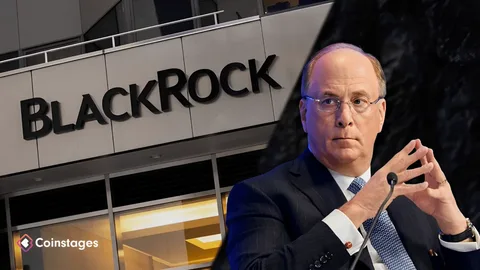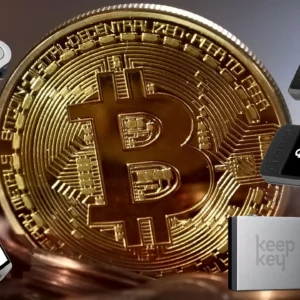Introduction
The convergence of traditional finance with innovative digital assets has long been a point of contention, interest, and speculation.
Few names carry more weight in the world of finance than Larry Fink, the CEO of BlackRock, the largest asset management firm in the world. In recent times, Fink has shown a growing interest in blockchain technology, with a particular focus on Ethereum, a leading blockchain platform.
This blog post explores how Larry Fink views Ethereum as a game changer for blockchain technology and the potential impact of such a shift on both traditional finance and decentralized digital assets.

Larry Fink’s Transition Toward Blockchain and Ethereum
Larry Fink’s gradual shift from a cautious observer to a vocal advocate of digital assets has captured the attention of investors, policymakers, and tech enthusiasts alike. BlackRock, under Fink’s leadership, oversees trillions of dollars in assets, and any endorsement or criticism from him can have widespread implications.
Historically, BlackRock has been known for its stronghold on traditional assets, but Fink’s recent remarks on blockchain technology—and Ethereum specifically—indicate a shift toward the future.
In this introductory section, we’ll look at Fink’s previous stance on digital currencies and blockchain, how his perspective has evolved, and why Ethereum has emerged as a focus point. As we dive deeper into this blog, we will analyze why Larry Fink sees Ethereum as a transformative force in blockchain technology and how BlackRock’s influence could reshape the entire landscape.
BlackRock’s Growing Interest in Digital Assets
The financial world has been carefully monitoring BlackRock’s movements in the realm of digital assets. With trillions of dollars in assets under management, the company’s actions resonate across markets. In the past, BlackRock was cautious about cryptocurrencies, viewing them as speculative and volatile. Larry Fink himself, at one point, expressed concerns over the legitimacy and security of digital currencies, believing that they were largely a tool for illicit activities.
However, over the years, as blockchain technology matured, so too did the perspectives of major financial institutions. Larry Fink’s rhetoric shifted, particularly as blockchain technology demonstrated its transformative potential in areas like supply chain management, financial transactions, and more. This change in tone became especially pronounced in discussions surrounding Ethereum.
BlackRock began exploring the idea of incorporating blockchain technology into its operations, driven by Ethereum’s smart contract capabilities. Ethereum’s decentralized platform allows for the creation of programmable contracts that can execute automatically when certain conditions are met, without the need for intermediaries. This efficiency and security are key factors that appeal to institutions like BlackRock, which manage enormous volumes of transactions.
Larry Fink’s growing interest in blockchain, particularly Ethereum, signifies that even the most traditional financial giants are starting to realize the future potential of digital assets. With Ethereum at the forefront of these discussions, it’s clear that the platform’s capabilities offer a solid foundation for BlackRock’s next phase of innovation.
Why Ethereum Stands Out Among Blockchain Technologies
One of the key questions raised by investors and industry experts is: why Ethereum? Of all the blockchain platforms available, what makes Ethereum stand out in the eyes of Larry Fink and BlackRock?
Ethereum is more than just a cryptocurrency. Its underlying blockchain technology allows for a wide range of applications beyond simple financial transactions. Ethereum introduced the concept of smart contracts, which are self-executing contracts with the terms of the agreement directly written into code. This innovation opened the door for decentralized applications (dApps), which run on Ethereum’s network and offer services across a variety of industries, from finance to healthcare to gaming.
The decentralized nature of Ethereum aligns with some of the key challenges faced by large financial institutions. Traditional systems often rely on a central authority to mediate and process transactions, which can be time-consuming, costly, and vulnerable to errors or fraud. Ethereum’s blockchain technology eliminates the need for a middleman, offering a transparent, secure, and efficient alternative.
Moreover, Ethereum’s scalability solutions, such as Ethereum 2.0, promise to address some of the platform’s early limitations, such as high gas fees and slower transaction speeds. These improvements make Ethereum even more attractive to institutional investors like BlackRock, who require large-scale, efficient infrastructure for their operations. Larry Fink’s endorsement of Ethereum speaks volumes about the platform’s ability to handle the complexities and demands of large financial systems.
Ethereum’s smart contracts, decentralized applications, and scalability efforts are exactly what make it stand out as a game changer in blockchain technology. It is not just a cryptocurrency, but an entire ecosystem capable of disrupting industries, which is why BlackRock and Larry Fink have taken a keen interest in it.
BlackRock’s Strategy for Integrating Blockchain Technology
Larry Fink’s growing interest in Ethereum points to a larger trend within BlackRock—its strategy for integrating blockchain technology into its vast portfolio of assets. With over $9 trillion under management, BlackRock’s potential move into the blockchain space could be a massive signal for the market.
While BlackRock has not fully committed to Ethereum or any specific blockchain platform publicly, it has been making strides toward the integration of digital assets and blockchain technology. Fink has hinted at the potential for creating blockchain-based financial products, including ETFs (exchange-traded funds) that track cryptocurrencies or blockchain-related companies. Ethereum’s robust smart contract system, in particular, could provide the underlying infrastructure for such products.
Another area where BlackRock could leverage Ethereum is through tokenization. Tokenization is the process of converting rights to an asset, such as real estate or securities, into a digital token on a blockchain. This offers greater liquidity, transparency, and efficiency in managing assets. Ethereum, with its smart contract functionality, is one of the leading platforms for asset tokenization, making it a prime candidate for BlackRock’s foray into this space.
Moreover, BlackRock could potentially explore decentralized finance (DeFi) applications built on Ethereum’s blockchain. DeFi represents a suite of financial services, including lending, borrowing, and trading, all conducted without intermediaries like banks. For BlackRock, DeFi could open new avenues of revenue and provide an innovative way to engage with the rapidly growing digital asset market.
Fink’s gradual shift in rhetoric toward Ethereum suggests that BlackRock sees value in blockchain technology beyond speculative investment. The asset management giant could be gearing up to build real financial products on Ethereum, which could revolutionize how institutions approach blockchain technology.
The Broader Implications of BlackRock’s Ethereum Adoption
If BlackRock, under Larry Fink’s leadership, continues to push towards integrating Ethereum and blockchain technology, the implications could be enormous. For one, this would lend a great deal of legitimacy to Ethereum and blockchain technology in general. Institutional adoption is one of the key factors that could drive mainstream acceptance of digital assets, and BlackRock’s involvement would be a watershed moment.
Ethereum’s adoption by major institutions like BlackRock could also accelerate the pace of innovation within the blockchain space. As more companies see the potential of decentralized finance, smart contracts, and dApps, we could see increased investment in Ethereum-based projects, further enhancing the platform’s capabilities and use cases.
In addition, regulatory scrutiny would likely increase as more traditional financial players enter the blockchain space. Larry Fink has previously expressed the need for clear regulations in the digital asset market, and BlackRock’s involvement could pressure governments and regulatory bodies to establish clearer guidelines for how these assets can be used. This, in turn, could lead to more stable and mature markets, making it easier for companies like BlackRock to participate fully.
Lastly, BlackRock’s interest in Ethereum could spur other institutional investors to follow suit. Once one major player steps into the blockchain world, others often follow. This domino effect could lead to a significant influx of institutional capital into Ethereum and other blockchain technologies, driving growth and innovation at an unprecedented scale.
Conclusion: The Future of Ethereum and Blockchain Technology
Larry Fink’s evolving stance on Ethereum and blockchain technology represents a pivotal moment for both the traditional financial world and the digital asset space. As the CEO of BlackRock, Fink’s endorsement of Ethereum could signal the beginning of a broader institutional acceptance of blockchain technology. Ethereum, with its smart contracts, scalability solutions, and decentralized applications, stands at the forefront of this transformation.
The integration of Ethereum into BlackRock’s operations could not only reshape the company but also revolutionize the entire blockchain ecosystem. As more institutions recognize the potential of Ethereum and blockchain technology, we could be on the cusp of a new era in both finance and technology.
What are your thoughts on Larry Fink’s views on Ethereum? Could BlackRock’s involvement change the future of blockchain technology? Let us know in the comments below!






